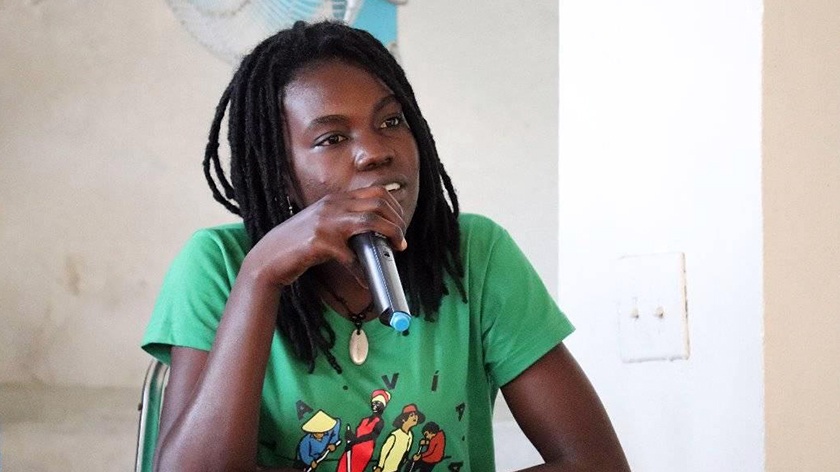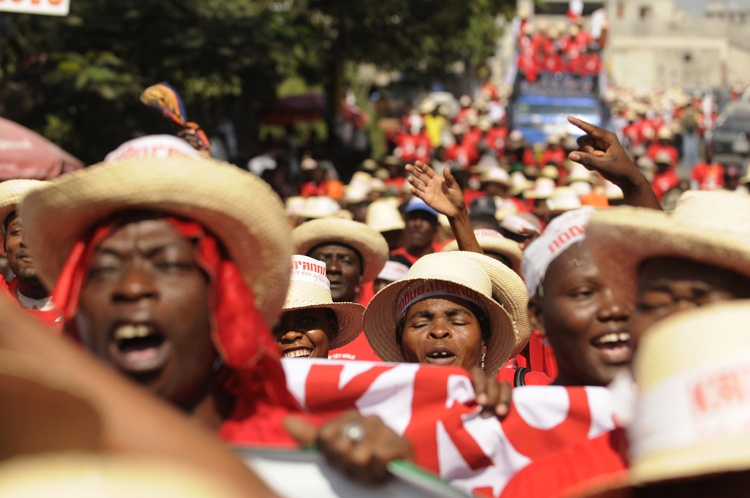At 29 years old, Islanda Micherline Aduel, the youngest of 4 siblings, is following in the footsteps of the person who has always inspired her: her mother, a country peasant, who has never ceased defending the rights of those like her. “It is my heritage.”

Haiti is her country. Plaisance, in the north, her home town. Port-au-Prince, the capital, where she has studied since 2011. Hair pulled back, finely braided. A smiling but determined gaze. A life overflowing with energy: Islanda is studying legal and political science. She is a tireless activist.
In her country, which is in the midst of a profound political, economic, and social crisis, where the aftershocks of the deadly earthquake in Porte-au-Prince are still visible 10 years after the event, this young Haitian woman hopes for change.
She leads her fight, like her mother, from within the peasants’ organization Têt Kolé, a partner of CCFD-Terre Solidaire (see the box below). The name is from the French for “Heads united” because “together, we peasants are stronger.”
Created in 1986, Têt Kolé sprung into action at that time to mobilize peasants against the dictatorial regime of the Duvalier family. Since then, the organization’s objectives have been defending the rights of local farmers and fighting to improve their living conditions. This is necessary because these communities have been neglected by a “failed state that does not implement any public policy” to support the agricultural sector. Worse, it is a “corrupt state that engages in land grabbing practices.”
The land taken from these local populations is transformed into free zones for the profit of “the grand bourgeoisie” of the country and for agricultural multinationals. The direct result: diminished sovereignty and food security for the peasants. Particularly affected are the Madansara – a Creole word for a nomadic bird that is used to refer to the mobile merchants in Haiti. These are peasant women who carry baskets of fruits and vegetables, often very heavy, on their heads for the entire day.
“They remind me of my mother; she herself was a Madansara for 20 years.” According to the young activists, their capacity for resistance and courage are without equal.
Islanda speaks about the peasant women in Haiti as much as possible on air, hosting one of Têt Kolé’s four community radio stations, the Plaisance station, in the program: “Women are Life.”
They are also at the heart of her Master’s thesis in Political Science: Political economies and conditions of the peasant women of Plaisance du Nord, “my community.”
“My mother, she was lucky enough to go to school.” But the majority of peasant women don’t know how to read or write. All the more reason for Islanda to tirelessly continue enriching her knowledge in order to assist them and better help them to defend their rights. She pursues knowledge at the university but learns just as much from within Têt Kolé, where she is taking numerous courses on literacy, gender, violence against women… On agroecology, food sovereignty, social economy and solidarity, human rights… And this interest reaches as far as Brazil where, for three months in 2019, she joined a course on Political Theories in Latin America at the national school Florestan Fernandes of the Landless Workers Movement (MST). “I am part of the youth movement that has decided to stay – the ones who fight for a better future here in Haiti.”
To be young in Haiti today? It’s not easy. There are those “who don’t see a future in Haiti” and who emigrate in search of a better life elsewhere. One of the underlying problems: in order to be able to leave, some young people sell their “ancestral lands.”
But “without a strong state to defend our rights, without dedicated policies for youths, how to convince them to stay?” Still, “personally, I am part of the youth movement that has decided to stay – the ones who fight for a better future here in Haiti.”
Two months ago, Islanda became one of the representatives of the youth articulation within La Via Campesina’s International Coordination Committee, “a big responsibility.” But not one that frightens her. On the contrary: one that makes her days a bit more fulfilling!
A fuller version of this article by Marion Chastain, article first appeared on the CCFD-Terre Solidaire website. CCFD is an ally of La Via Campesina’s global movement for food sovereignty.

